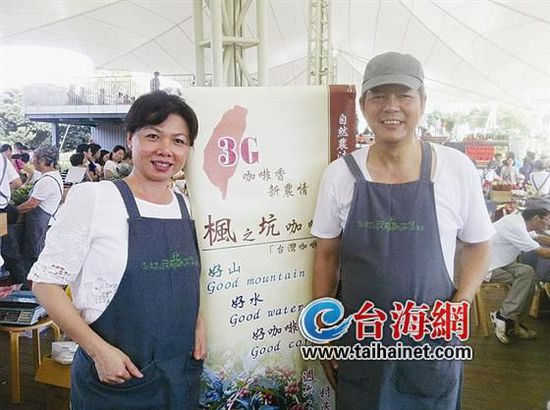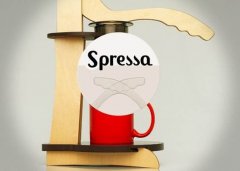Taiwan's "coffee instructor" who doesn't want to just sell coffee to make money.
Taiwan Strait Network (Weibo) July 2 (Wang Wei Wen, a reporter stationed in Taiwan by the Straits Guide News) there is a unique "slightly hot hill villager bazaar" on the Bagua Mountain, which straddles Zhongzhangtou in central Taiwan. it originated from the villagers' bazaar set up by the well-known local pineapple cake merchant "Micro Hot Hill" to give back to the surrounding farmers. Lin Wenqing, a retired instructor, is one of the members of this bustling bazaar on weekends and holidays. And the guide reporter accidentally crossed the mountains, not only had the opportunity to get acquainted with him, but also tasted the unusual ancient coffee.

On the face of it, Lin Wenqing is no different from ordinary villagers-dark, healthy skin, warm and cheerful smile, but straight waist and posture reveal faint traces of military career. He is a retired instructor at Jianguo University of Science and Technology, because his hometown is in Fenyuan Township, Changhua, at the foot of Bagua Mountain, so he and his wife Lu Yuzi planted coffee and created their own brand Maple Coffee.
Lin Wenqing also has an interesting story about why he grows coffee. Seven or eight years ago, a group of Japanese old people came to Fenyuan Township. They said they wanted to find a coffee garden in their childhood memories. However, not only does Fenyuan Township in reality have no coffee garden at all, but there is no record of growing coffee here. With the idea of finding out, Lin Wenqing visited the countryside and was surprised to learn from the old farmer that there were indeed some coffee trees here, but people did not know what the use was, and most of them cut down betel nuts instead.
It turns out that as early as 100 years ago during the Japanese occupation, Baguashan District began to introduce coffee, which should be the earliest coffee producing area in Taiwan. Most of the boutique coffee harvested that year was sent to the Japanese royal family to pay tribute. But later, as the Japanese were defeated and left Taiwan, the coffee industry fell and the coffee garden was abandoned.
Fortunately, under the guidance of local farmers, Lin Wenqing actually found a century-old coffee tree in Fengkeng Village in Fenyuan Township, confirming that this should be the coffee garden that the Japanese could not find.
As a result, after retiring from teaching at the university, Lin Wenqing devoted herself to the coffee garden in her hometown. He grows one hectare himself and forms an alliance with other coffee farmers, which now has a total area of 10 hectares. With a certain amount of output, coupled with the high quality of coffee beans grown and baked by natural farming methods, Lin Wenqing began to build and manage his own brand. "Coffee instructor" is becoming more and more famous, but Lin Wenqing's greatest wish is not to make money from this, but to make betel nut trees on the mountain gradually replaced by coffee trees as more and more farmers grow coffee. Because the cultivation of betel nut is not conducive to soil and water conservation in mountainous areas, and the income is not good, if the coffee industry in my hometown can be restored, it will recreate a legend of Taiwan's agriculture.
Important Notice :
前街咖啡 FrontStreet Coffee has moved to new addredd:
FrontStreet Coffee Address: 315,Donghua East Road,GuangZhou
Tel:020 38364473
- Prev

Spressa Philharmonic pressure aids make it easier to make coffee
Spressa is a very easy-to-use tool co-invented by Dan Erickson and Ross M Colquhoun to make it easier for people to try out the Philharmonic Coffee making system. Interested friends can first enjoy the introduction video of Spressa, and then they can have a basic understanding of it. The purpose of Spressa is to make people
- Next

Coffee lovers Do you have amazing beauty benefits from coffee?
Coffee is a magical presence in our lives. In addition to injecting energy into our work and study in a timely manner, there are unexpected beauty effects. Here are 7 ways coffee contributes to our beauty and health. Explore them together and you'll love it even more. Coffee Beauty 1. Antioxidant Coffee Antioxidant We are often exposed to antioxidants
Related
- Can lightly roasted coffee beans be used to extract espresso? How finely should you grind high-quality coffee beans to make Italian latte?
- What is the difference between the world's top rose summer coffee and Yejia Shefi? What are the flavor characteristics of Yega Shefi coffee and Panama rose summer?
- The ceremony is full! Starbucks starts to cut the ribbon at a complimentary coffee station?!
- A whole Michelin meal?! Lucky launches the new "Small Butter Apple Crispy Latte"
- Three tips for adjusting espresso on rainy days! Quickly find the right water temperature, powder, and grinding ratio for espresso!
- How much hot water does it take to brew hanging ear coffee? How does it taste best? Can hot water from the water dispenser be used to make ear drip coffee?
- What grade does Jamaica Blue Mountain No. 1 coffee belong to and how to drink it better? What is the highest grade of Blue Mountain coffee for coffee aristocrats?
- What are the flavor characteristics of the world-famous coffee Blue Mountain No. 1 Golden Mantelin? What are the characteristics of deep-roasted bitter coffee?
- Can I make coffee a second time in an Italian hand-brewed mocha pot? Why can't coffee be brewed several times like tea leaves?
- Hand-brewed coffee flows with a knife and a tornado. How to brew it? What is the proportion of grinding water and water temperature divided into?

